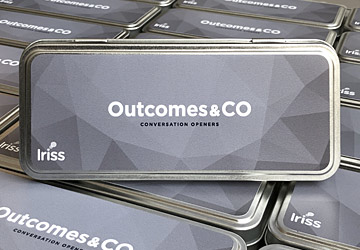
Outcomes & CO
Provides a framework for open, honest conversations about personal outcomes.
In the last year we've worked across Scotland, as far north as Elgin and as far south as Kilmarnock.
6,212 followers
Up 709 on previous year
298 page likes
Up 170 on previous year
305 follows
105 followers
Up 76 on previous year
209,227
Up 28,512 on previous year
85.1%
Up 10% on previous year
493,020
Up 73,011 on previous year
In partnership with Centre for Youth and Criminal Justice (CYCJ), we created Journey through Justice, an interactive guide through the youth justice system for children and young people.
As part of the ‘Promoting public understanding’ strand of the Social Work Services Strategic Forum's vision and strategy, we created a visual summary of the Social Work Scotland research on public perceptions of social services.
“How much do the public know and understand the Scottish Social Services? @irissorg have produced a user friendly summary report of @socworkscot research into the public understanding of the sector. Read the full report and summary here http://bit.ly/2BmV1AK.”
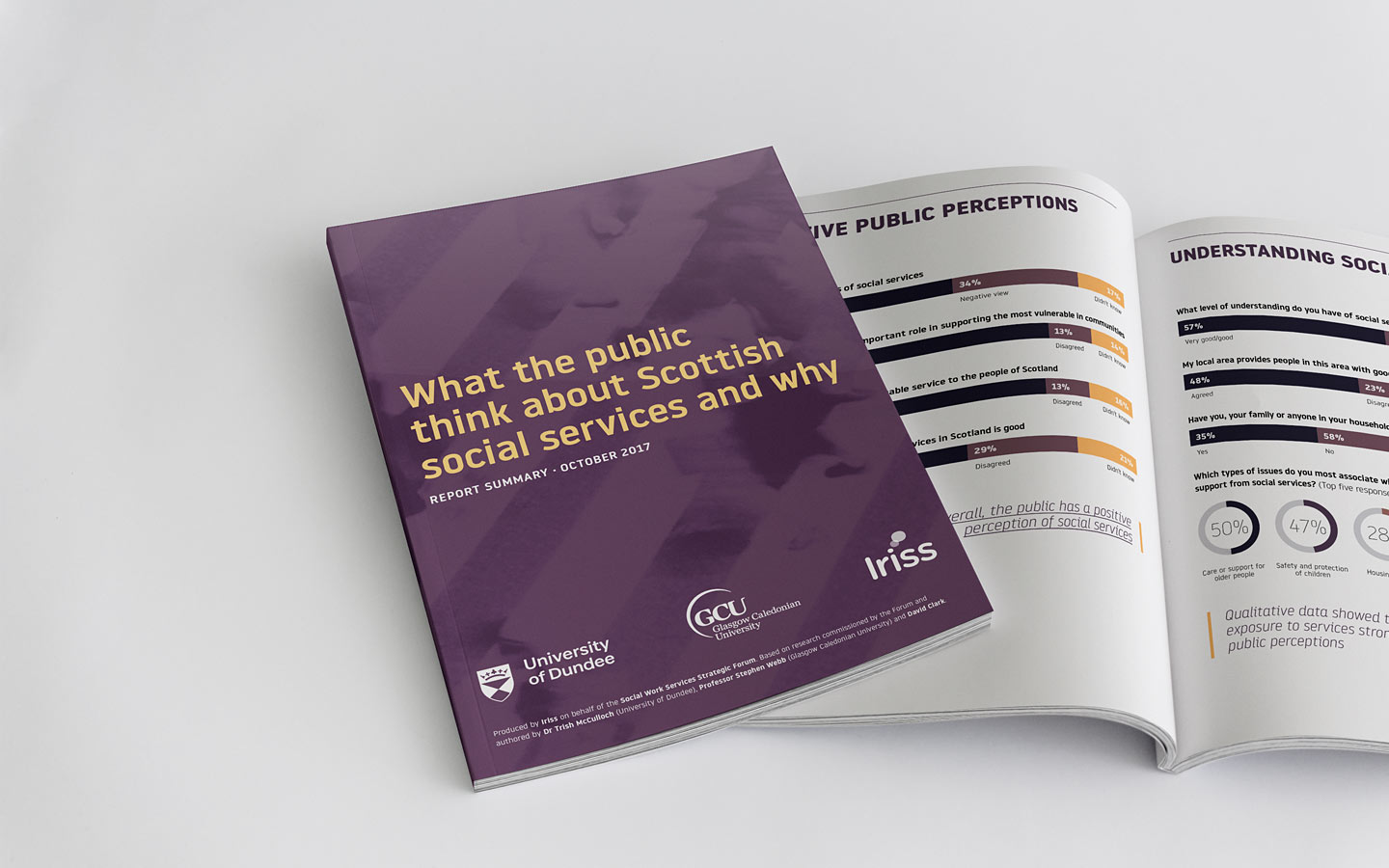
We produced four new toolkits this year…

Provides a framework for open, honest conversations about personal outcomes.

A framework for navigating conversations that can support an effective partnership.
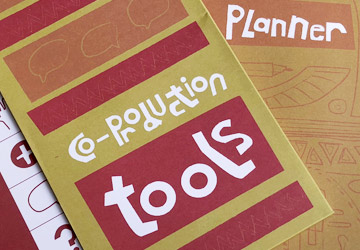
A free resource that focuses on putting ideas into action.
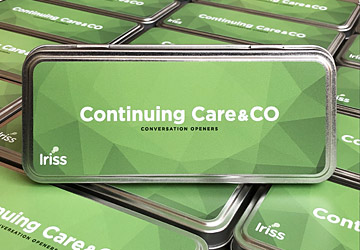
Supporting practitioners to reflect on their views and values when continuing to care for young people who are leaving care.
We had over 485 requests for the Co-production Project Planner in just two months.
“Thank you @irissorg for this brilliant *free!* co-production resource. Loads of imaginative and practical ideas for methods of engaging with people with different skills and styles in capturing lived experience and developing ideas and solutions.”
"I was embarrassingly excited to receive this today — #coproduction is my absolute favourite part of my work. Thank you @irissorg for a fantastic resource."
"#coproduction toolkit from @irissorg arrived today. Excellent toolkit, helpful for developing our #SDS offering called #LiveTheLifeYouCreate. #ChoiceControl #coproduction thanks @irissorg."
"Extremely excited to see this resource delivery ready for distribution to our @EAHSCP care homes. Can't wait to explore the value of these Emma & Karen @irissorg @personaloutcom1."
We published five new Insights across 2017/18:
“Thanks to @irissorg — great #childprotection resource: listening to #parents Great timing: having @cisweb designated officer training today.”
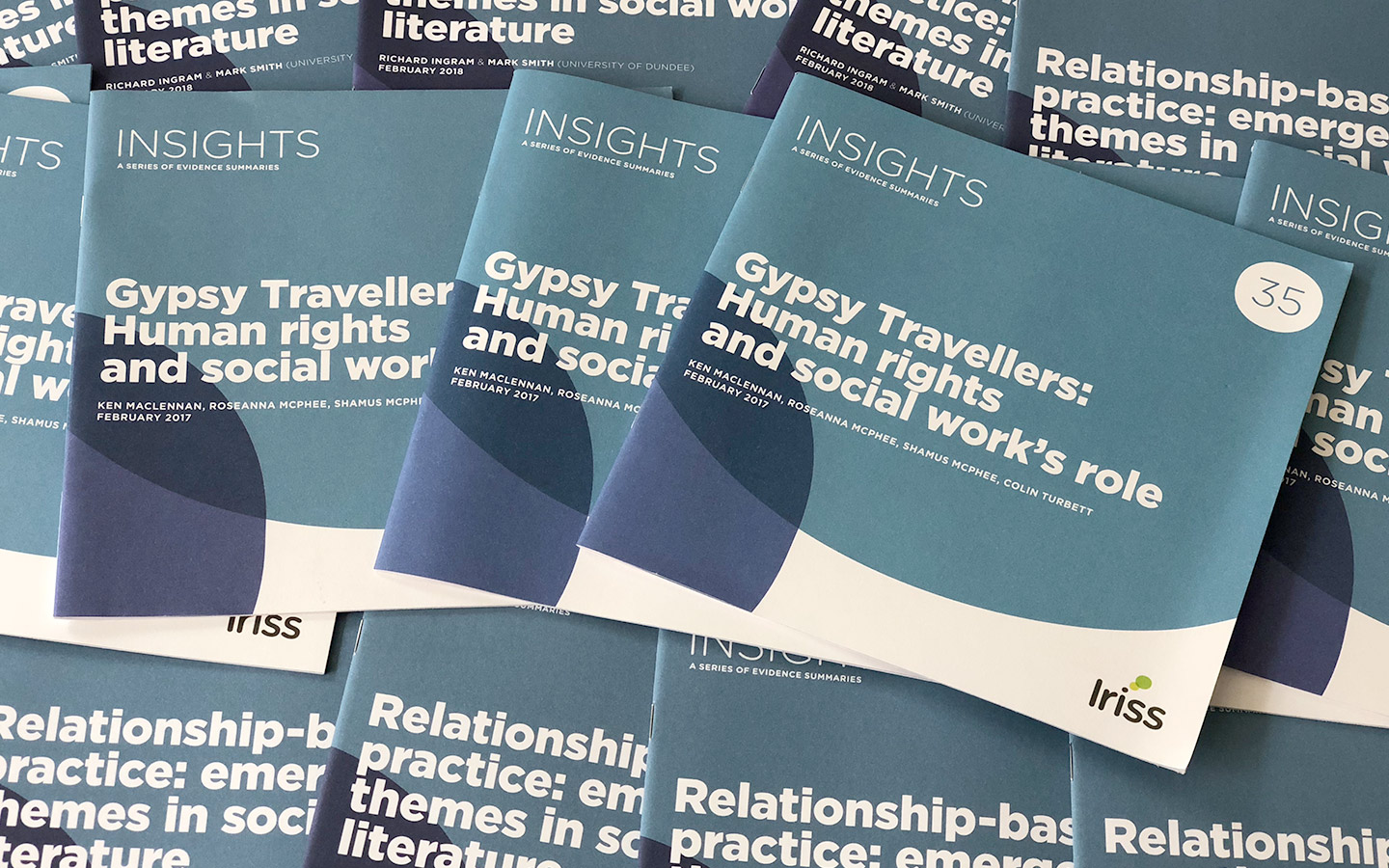
We produced 19 new episodes, taking us up to 196 Iriss.fm episodes to date.
Episodes published between October and December had a total of 840 plays, nearly double that of the previous three months.
Across all episodes there was a total of 14,066 plays between October and December, compared to approximately 1000 plays in previous three months.
“Inspiring episode on Iriss.fm on the publication of the Passport to Independent Living and hearing the ways that Personal Assistants are providing such excellent support to folk on their journeys to independence.”
“Great interview with a male support worker exploring motivations for working in care over at @irissorg Iriss.fm.”

Our work supports the realisation of the Vision and Strategy for Scotland's Social Services.
| Theme | Projects |
|---|---|
| Improving use of evidence |
|
| Supporting the workforce |
|
| Understanding service quality & performance |
|
| Promoting public understanding |
|
What follows is a summary of our activity under each of these overarching themes…
Captured and shared the evidence and learning about the partnership model between four leading children's charities involved in DEIT.
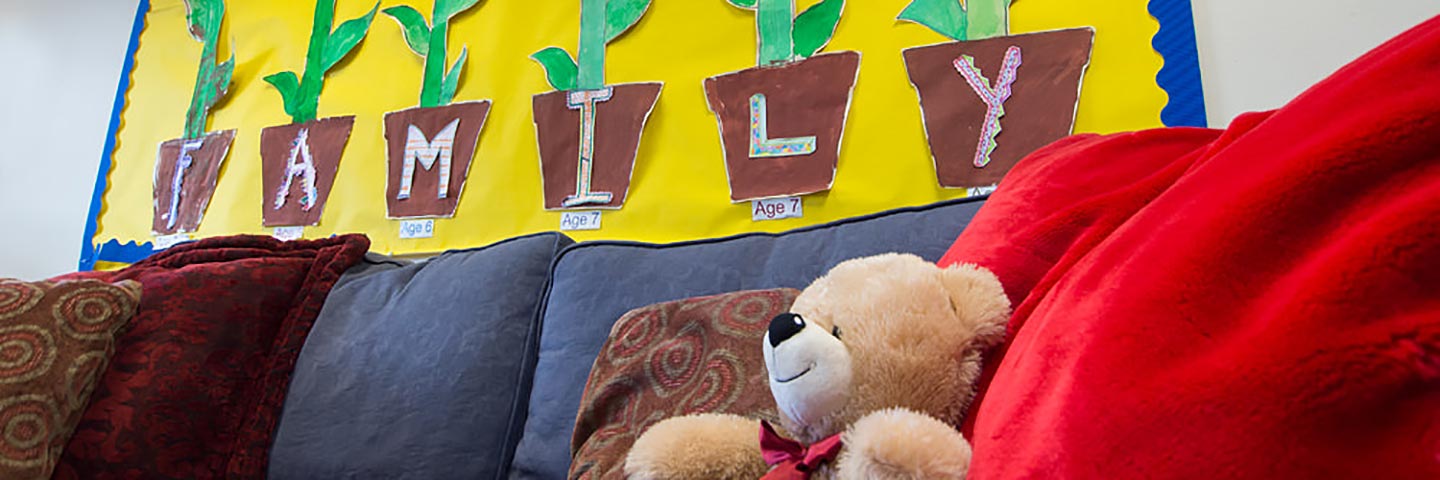
Partners wanted to better understand the unique nature of the partnership and the difference this makes to families accessing DEIT support. What surfaced was that the success and effectiveness of the partnership lay in the quality of conversations in the partnership — continuous, reflective, cross-cutting, sometimes difficult — which were ultimately, a key mechanism to making a difference to families in Dundee.
From this learning, Partnerships & CO tool was created to support these types of conversation, and to provide a practical framework for others to explore aspects of partnership working. Explore the DEIT conversations.
Partnership working is complex but effective when there’s shared understanding about the difference it seeks to make. It’s important that any complexity of a partnership does not impact on people accessing support or referrers. Pathways into the service should be simple.
Creation of 10-step Community of Enquiry guide to support collaborative exploration of ideas.
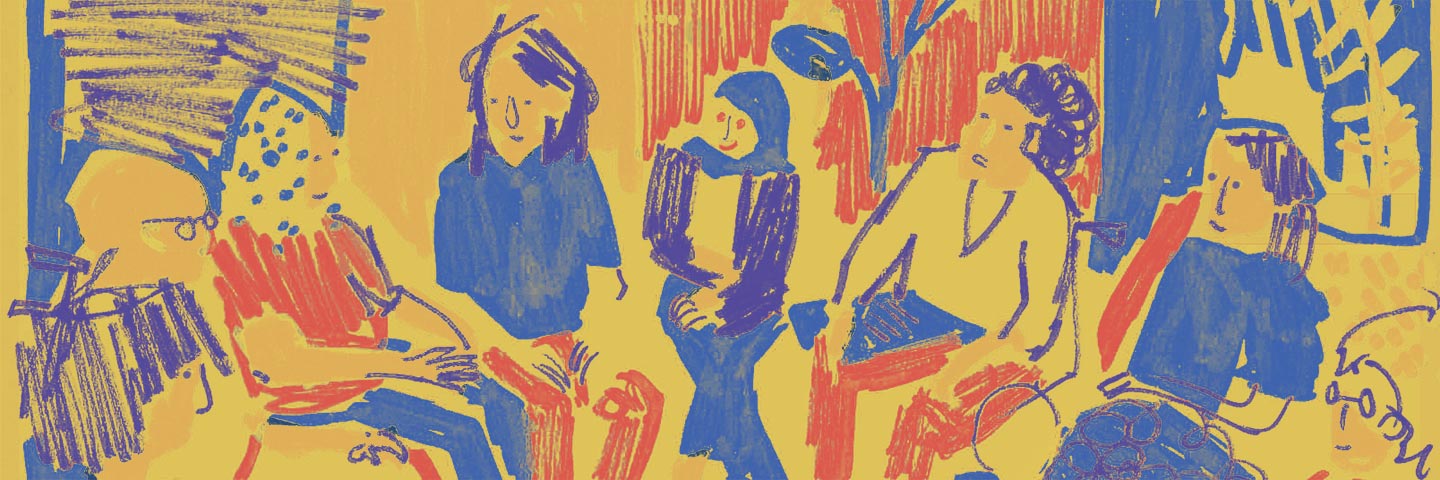
A Community of Enquiry (CoE) is a facilitated workshop session that offers space for a group of people to collaboratively explore ideas and ask rich and meaningful questions of each other. Over the year, Aberlour Child Care Trust and Loretto Care brought their own enquiries to Iriss facilitated CoE workshops.
As a result of feedback from these workshops and the processes that were used by Iriss, the Community of Enquiry Guide was produced.
We often hear from those that we work with that they value both the time and space to explore ideas and that open discussions don't always happen as often as they would like in their workplaces. The CoE Guide aims to support this to happen.
Published ten summaries of evidence on social services topics.

This service launched in September 2017 and to date enquirers have been delighted with the new service — its quick response times and quality of outputs.
Everyone who has had an Outline (summary of evidence) produced for them so far has reported that they have already used some of the evidence provided, and that the service has increased their use of evidence and their confidence in finding and using it. Outlines have been used to support the development of social worker assessments, children’s plans, service development proposals, training materials, funding proposals, lecture content and slides, and articles sharing good practice.
"This material is immensely valuable — so much so that I will be adding this information to a CP course that I have been working on for a number of months…hopefully, and critically, it will be part of a foundation that improves the quality of practice and ultimately outcomes for children."
"Thank you very much for this — it gives us a comprehensive overview of current research and opinion around voluntary vs statutory placements. It also shows a need, perhaps, for further research into placements and employability. I will share this with fellow independent practice teachers."
A clearer picture of the reasons people use evidence and what they're hoping to achieve from drawing on the evidence base is required. A balance between empirical knowledge and lived experience is necessary to identify gaps in knowledge and skills relating to finding, evaluating, using and sharing evidence. Online and face-to-face learning resources are planned to support workforce development in this area.
An event that convened 30 leaders from practice and policy with an interest in use and adoption of evidence across health and social care, justice, housing and education.
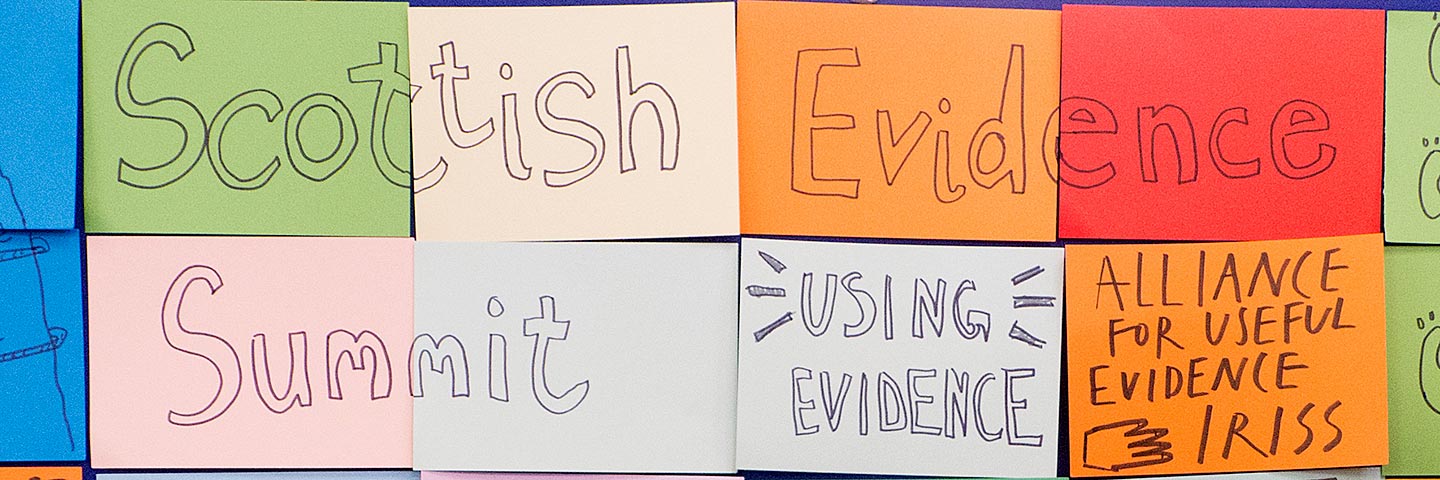
The event shared experiences from influencers about their experiences of evidence use and priorities for the future use of evidence. One of the early messages from the activity was the need to learn from beyond social services about evidence use and understanding.
The online report includes a summary of survey findings, notes from the event, as well as an edited film of the presentations on the day. This develops our thinking on the implementation of evidence use, as well as the types of skill needed to encourage this. We will follow this event up with a day later in 2018 that will specifically bring together those from social services to respond to this and discuss future actions.
"This has been an excellent day and I have already started following up on connections made."
"I found this to be a very useful day and would be keen to explore further opportunities for formal partnering with a number of organisations in the room."
This was a great format for getting a feel for how other sectors are currently prioritising the use of evidence. It revealed that there were many similarities in strategic and policy approach across the sectors. However, there is a need to examine how this actually looks to people working at the frontline and how sectors and organisations can keep the momentum and quality of evidence use up when they work in such fast changing areas.
Promotion of Gypsy Traveller human rights and more culturally competent practice.

Over the past two years we’ve published an Insight, a pictorial timeline and have run two events — one in partnership with SASW and chaired by Lesley Riddoch; and another on co-producing cultural competency.
We had an invitation to Scottish Parliament to meet with members of the Equalities and Human Rights Committee (EHRiC), to discuss how they might best use the opportunity of Human Rights Day work to promote the culture of, and/or important issues for, Gypsy Traveller communities in Scotland. This was followed by an invitation to return to Scottish Parliament in December 2017.
Feedback from the EHRiC, highlighted how the evidence we, and others gave, at the above session informed the issues debated the following week on the Scottish Government's new Race Equality Framework. A positive news story was published in the Sunday Herald in December 2017.
“How do we co-produce ‘cultural competency’ & best work with Gypsy, Traveller & Roma communities in Scotland? Attending this amazing event today at the Kinning Park Complex. Such a great line-up of speakers.”
You need to work with rather than do to this community and others, using all assets and building relationships and trust to overcome understandable mistrust. There has been interest in our resources for this ‘niche area’, however, success with respect to scale and reach should be considered in terms of us reaching those with agency, and influence making real change possible moving forward. Good timing, coalition and coalescence are key in this, as well as drive and temerity. There has been progress for Iriss in terms of employing culturally competent approaches, but there’s still some way to go.
Creation of a search demonstrator and a who’s who of evidence.

A partnership project of Iriss, Scottish Government, SSSC and Care Inspectorate, it resulted in the creation of a search demonstrator and a website that provides information on who provides evidence on what topics and in what form.
Search demonstrator
Built using Google Custom Search, the search demonstrator was published to partner websites and feedback was sought feed requested via an online survey. 70% of respondents indicated they would recommend this service.
"Love this! I found a range of information across several sites and it was so easy. Thank you."
“Everything in the one place. Excellent.”
Jumpstart your knowledge
A website was created as a test to map out places that people could find evidence on various topics and in different forms. Jumpstart your knowledge acts as a ‘way-in’ to finding evidence for social services. Development is ongoing.
Google Custom Search is free to use and was easy to set-up. The search itself was fast and accurate. Users reported that it was easy to use and saved time. However, better paid options such as Swiftype exist which are easier to manage and maintain.
An online learning course for students and qualified practitioners.

Students (74 in total) of social work from the University of Strathclyde (1st Year) and University of Dundee (Masters’ programme) signed up to a facilitated ‘Grow your Personal Learning Network’ online course.
67 qualified practitioners signed up to a separate, self-managed course. Seven local authorities were represented along with a range of third sector organisations including Sense Scotland, Carr Gomm, Alzheimer Scotland, Action Group, Positive Prisons, Barnardo’s and Who Cares Scotland.
As well as learning about social media (Twitter, Diigo, Evernote and Scoop It!), the course aimed to encourage exploration of the web and develop the individual’s confidence in self-directed learning.
“I think social learning can be beneficial in today’s workplace where there is multi-agency working as it is an easier and less time consuming way of sharing information and learning from other professionals from different organisations and locations.” Student
"What has increased in recent months is my use of social media as a practitioner and on behalf of the service I work for. I'm less afraid to add a professional tweet. Most importantly I am exploring and widening my networks — mostly as an organisation but I'm becoming more confident as an independent professional.” Practitioner
“…this course has increased my confidence and provided me with wider learning opportunities and further reading/researching.” Practitioner
Time remains an issue for completion of the course; work commitments and changes in working arrangements were often cited as barriers. Some participants gained an awareness around use of social media for professional, as well as personal use. Some realised its potential for learning rather than just communication. Concerns included the credibility of online information, the ‘always on’ expectation, cyber bullying, social media being banned in workplace, and the need for a balance in online and face-to-face engagement.
Case studies that showcased what community social work looks like, involves, and what it’s able to achieve.

The seven case studies celebrated both the voices of social work practitioners and the clients and communities that they support. They cover initiatives such as the anti-poverty project at Annette St. Primary School in Govanhill, supporting the Roma community; and BALL (Be Active Life Long) groups in Moray for people over 60 to help them stay active and connected to their community.
"I think the whole concept of what ‘community’ means and crucially what it can do will become a lot more prevalent next year within the implementation of strand two of the national Health and Social Care Workforce plan. Supporting people to become more active (as opposed to passive recipients of available services) and use SDS as well as means of community supports done by and for will I think become the new mantra — so you are ahead of the curve here.” Trisha Hall
The case studies (to be made available in April 2018) are examples of what can be achieved when you work with and not for communities. It’s work not often celebrated, and too often seen as peripheral and non-priority. It is important in the context of the ongoing debate about universal and targeted services, prevention and early intervention, agency and better outcomes with limited resources. There is an acceptance that ‘community’ is an important cornerstone of policy, but what does this mean for practitioners going forward?
Use of experience-based co-design to develop integrated pathways to treatment.

This work involved a cohort of regular A&E attenders with mental distress, and practitioners. It followed a six-stage experience-based co-design process. Three key achievements:
Working across the 'divide' of integration takes its toll on the people involved. There is preoccupation with ‘ownership’ of activities, as roles are very stretched.
Celebrating service user and carer involvement in social work education, sharing transferrable learning and directing future ambitions.
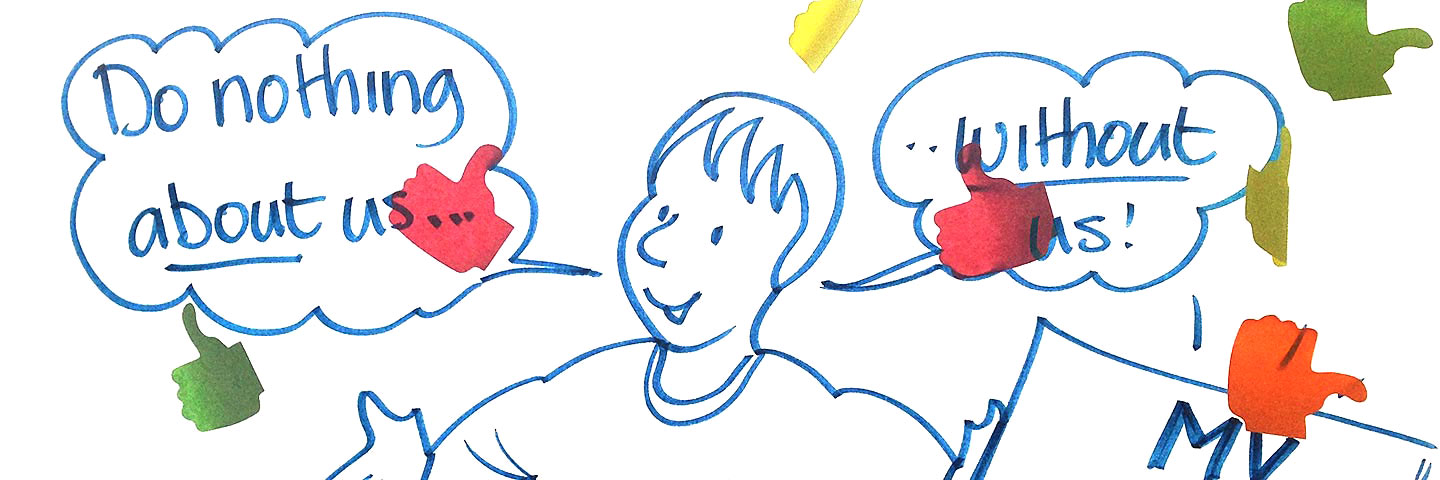
Service user and carer involvement in social work education has been mandatory for 15 years; there is a lot of learning to share. Iriss and the Scottish Inter-University Service User and Carer network (SIUSUACN) worked together to tell eight stories, grounded in real life context and experience. This resource will be available in the summer of 2018.
Iriss and SIUSUACN also co-planned and delivered an event on 17 April 2018, with over 70 delegates attending to celebrate, share and extend their learning. It was an opportunity to exchange knowledge with international contributors from Sweden and Belgium too, and look to the future, asking: what next for service user and carer involvement?
“It went great, right down to the choir/communal singing at the end! Lots of wishes and actions were collected, and the two European presentations were very interesting. Lots of learning was exchanged … an excellent mix of participants there.”
Active participation, true to the principles of co-production is extremely rewarding, but takes time, negotiation and flexibility to be inclusive and participatory. In telling the eight stories, we worked with the individual universities to agree a plan that would work for them, so methods and media have been different. Limited time to achieve this has been challenging, but everyone has pulled together to help make it happen.
Inaugural national conference for final year Higher National students, destined for a career in social care or early years.
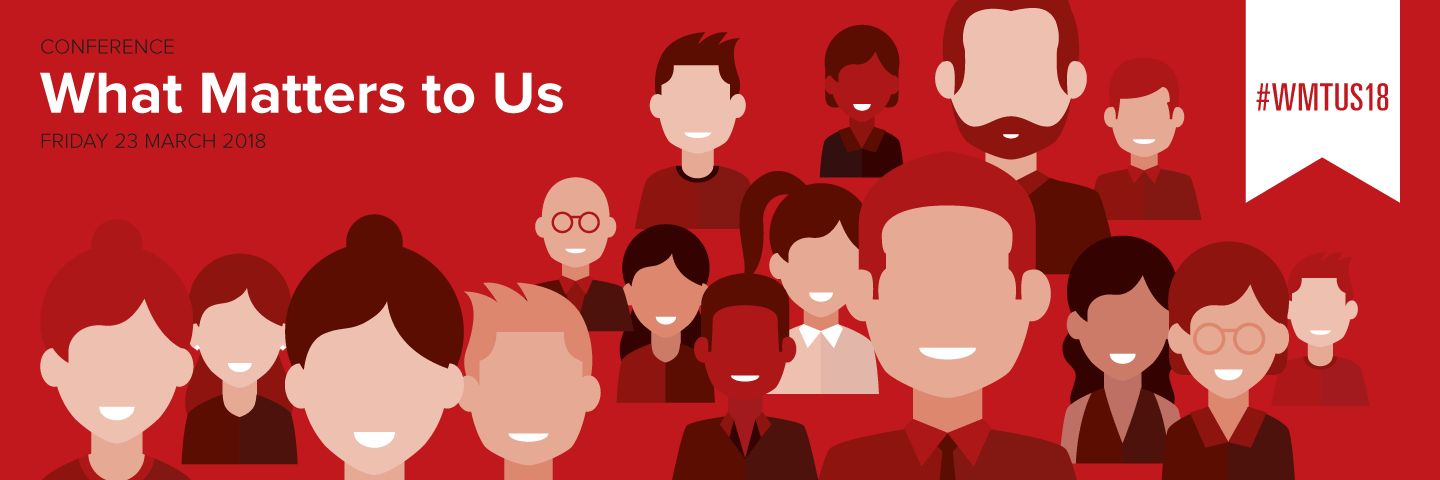
This provided an opportunity for 160 final year students to come together at a key point of transition, providing inspiration keynotes on how to deliver services that are person-centred and matter to people. In workshops, there were opportunities to hear from service users and carers, learn from newly-qualified workers and hear about career journeys, consider digital futures and how to take care of yourself as a worker.
The conference was a partnership, brokered by Iriss, and involved the Scottish Social Services Council, the College Development Network, Early Years Scotland, the ALLIANCE and representatives from the college sector, including its host, Glasgow City College.
“Always ask 'What matters to you!'”
“My take home message is to be passionate, think about what matters and make a difference!”
“Inspired to be a better practitioner, knowing what to do when I leave college and learning about the current issues in Early Years.”
Different partners were able to contribute in different ways, and it took determination and commitment to make this happen the first time around. It would be great to build on this, and deliver as an annual event. It was another reminder to us of the importance of having service users and carers involved, as hearing from them brings home to people why their job really matters, and the difference they can make to people’s lives. This is why people have come into these professions in the first place, and what delegates took most inspiration from.
A small-scale test of improvement in Highlands.

This work developed as a response to the wealth of qualitative data about the daily challenges facing those who provide care and support. It was focused on improving the experience of the workforce by giving them space and support to develop ideas to help them improve their experience of their role. We ran three workshops with the Telford Centre in Highlands.
The staff group at Telford identified that feelings of frustration and helplessness which emerge when facing incidents outwith their control, and managing their reaction to incidents more effectively, could be better handled.
An afternoon ‘tea-brief’ was tested with staff, residents and older people who access day care, with the intention of providing staff with time and spend time together and slow things down.
“I was surprised that the workshops were mainly aimed at understanding staff’s feelings and emotions (and my own) from that opened up discussions which were interesting and informative.” Participant
“It was good to hear how other staff felt about work problems and ideas of how to overcome them.” Participant
The tea-brief was more resident rather than staff focused and didn’t provide enough reflection time for staff. The group felt that it was difficult to focus on themselves. This was an ongoing challenge throughout the process; the group needed to be regularly reminded that the project was about experience rather than practice. Despite the challenges, some members of the group found it helpful and were keen to use the tools in their work.
Four-day interactive public exhibition to showcase stories and reflections of the frontline social services workforce.
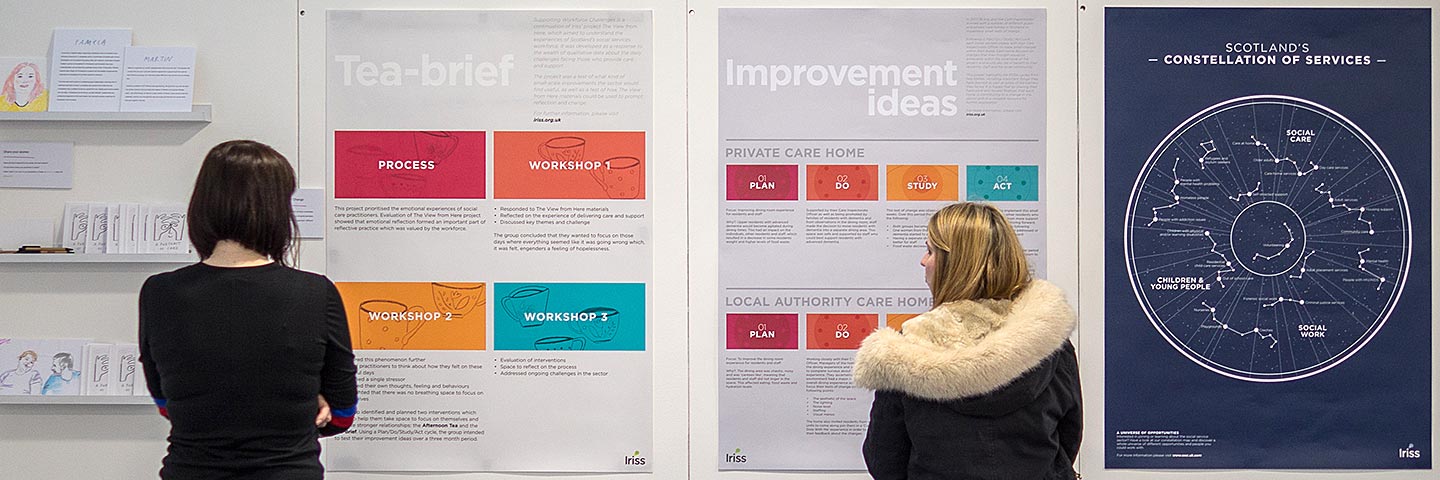
In March (15-18th), we hosted ‘A Portrait of Care’, which coincided with World Social Work Day and aimed to celebrate the great work of the sector, understand practitioners' views, as well as provide an opportunity to share key insights from the public.
The pop-up event had over 100 visitors through the door, including those from sector organisations and the general public. Submitted stories were exhibited alongside other sector information and there were a number of ‘table-talks’ over the course of the exhibition.
Visitors were asked a number of questions, including their aspirations for the sector and what needs to happen to achieve them, and the qualities people need to work in the sector. The event report provides a summary of this feedback.
This event was an important contribution to showcasing the positive work of the social services workforce. There will be value in building on this work to influence public perceptions and support recruitment and retention of staff in the profession.
Testing out the standards in practice and building an evidence base of ‘what works’.

Iriss has been working in partnership with the new Health and Social Care Standards Implementation Team, including the Care Inspectorate to:
This work is ongoing. Flexibility is required in the co-production of the project. Focus and vision have shifted and changed as the partnerships develop, but this has been really positive and reflects the reality of using a co-production approach.
Positive changes for the people and organisations of a local community.
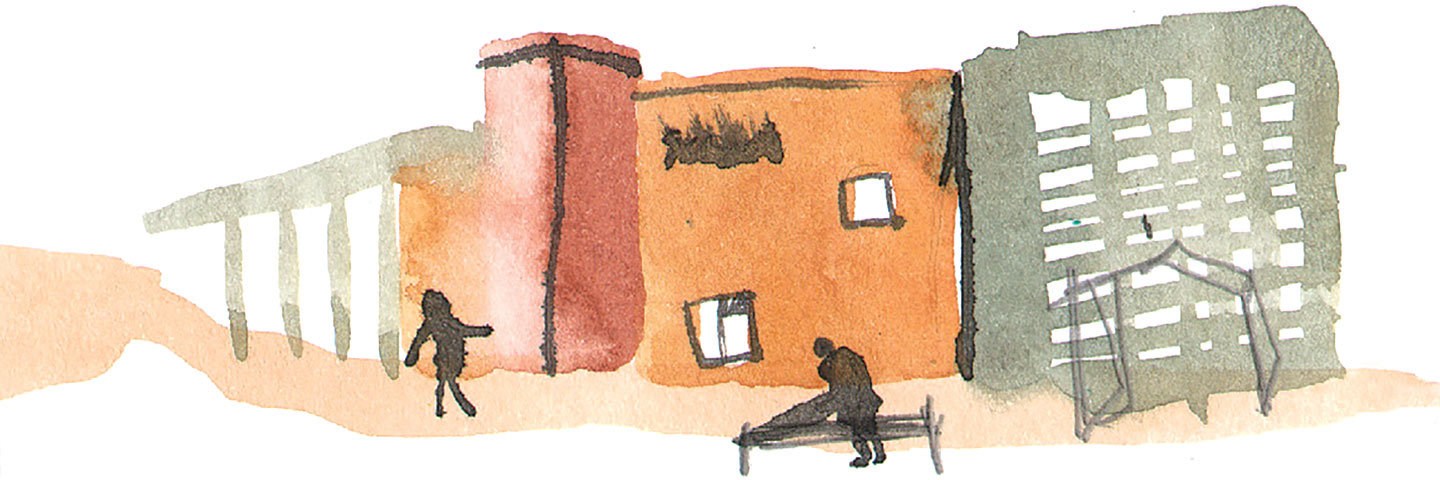
This work explored with local people in the Maddiston and Rumford area of Falkirk how they feel about the area they live in, and how we could work with them to make some real positive changes.
A community Feast event brought together local people and organisations to celebrate, and share food and ideas around activities that would benefit the area. Following a community vote at the Feast, five local projects were given small amounts of money to spend on activities that were deemed to have a real positive impact on local people.
An asset map has been collated and hosted by Maddiston Community Council, which captures the range of the local community assets (resources, places, activities and businesses) in the area.
An activity report of the partnership work was published in July 2017. The project also featured in the Falkirk Herald.
"Iriss involvement really gave us the impetus to get involved that we didn't have before." Partner organisation
"We have been using the report for all types of meetings… this isn't going to be the end of what we are involved with… we feel this has given us a great platform to shout louder for what we need in our community." Community member
New connections and relationships between individuals and organisations have now been established. There are, however, more tangible effects, evident in the practical impact of the individual projects that were funded, such as the continued use and upkeep of the community asset map, as well as the ongoing use of the project report to help the community justify, and argue for, further resources and supports in their area.
Test of an improvement guide by the Care Inspectorate and care services.

In 2016, Iriss and the Care Inspectorate came together to explore how scrutiny can support improvement in services. This resulted in the creation of an improvement guide which was circulated to teams of inspectors who work with adult services.
This year was all about testing the improvement guide in practice. A number of independent care organisations and local authorities got involved alongside the Care Inspectorate.
Iriss introduced a PDSA (plan, do, study, act) cycle to test different changes that care homes wanted to make. Focusing on small improvements, a number of the homes started by looking at their dining environment and how it affected the health and wellbeing of both their staff and residents. Others explored how positive reinforcement was used by the management team to support staff members in achieving required outcomes, or attaining particular qualifications for their practice.
Participants worked on their tests of change supported by their Care Inspectorate officer. This relationship was both beneficial to the project and the overall relationship between staff and the Care Inspectorate.
There were some barriers to progress which included care homes pulling out due to incidents with residents, lack of management support, lack of time and resources, and changes in staff.
Storytelling to demonstrate impact.

Action learning set sessions were conducted with representatives of around ten participant organisations funded by the Children, Young People and Families Early Intervention Fund and Adult Learning and Empowering Communities Fund (CYPFEIF and ALEC Fund). These followed on from an initial session in 2016-2017 around contribution analysis that was run by Iriss.
Two sessions gave participants the freedom to discuss a range of issues around impact and evaluation. This helped them support each other to share learning, experiences and solutions with each other through an action learning set process.
This has strengthened their ability to report on the activity of their work, and also given them more confidence in reporting in ways they hadn't considered before, especially around the use of storytelling, and including a wider range of stakeholders in their evaluations.
Most of them were also from very small organisations, so the sharing of experiences from others in similar situations were reported as being extremely valuable.
"The networking and group discussion have been the best bits…great to speak freely and leave with some solutions."
"This has given me time to take a step back and reflect on how we understand our impact."
Between sessions people were encouraged to go away and take their own actions based on the discussions of the group. They could then report back on what they had tried and gain feedback from group members. Actions identified:
Piloting improvements in supervision practice.

Working with SSSC, we supported partners to identify and make changes to their supervision practice, reflecting on the roles of leadership and management. We also explored how a leadership logic model might help them do this. Workshops brought partners together — for individual and joint sessions — using a range of methods, including Appreciative Inquiry, Action Learning and Storytelling, to capture their learning.
Over the course of the project, partners reported significant shifts in their thinking about leadership and management within the supervisory relationship. This resulted in implementing changes in their organisations, including piloting new approaches within their own practice with colleagues/teams, as well as rewriting policies, records and guidance.
The project culminated in an event where the participating groups shared their work with a wider social care audience.
We also partnered with the Village Storytelling Centre to capture the stories of the three groups, with the hope that this will reveal their journey through the time of the project. These will be published as podcasts, alongside reflections from SSSC and Iriss learning and findings from the work.
“Fantastic support from @SSSCLeadership @SSSCLearnTech & @irissorg @DrStuMuirhead cannot thank them enough for helping us gain clarity throughout this project #socialcare.”
“It’s been a pleasure, we’ve felt inspired, contained, energised, challenged, directed, supported. Thanks a million to Stuart and Lorna. You’ve both been amazing!”
Asking ‘why do we do supervision?’ was a really good starting point for partners to focus on the changes they wanted to make. Some partner organisational structures made changes easier than others.